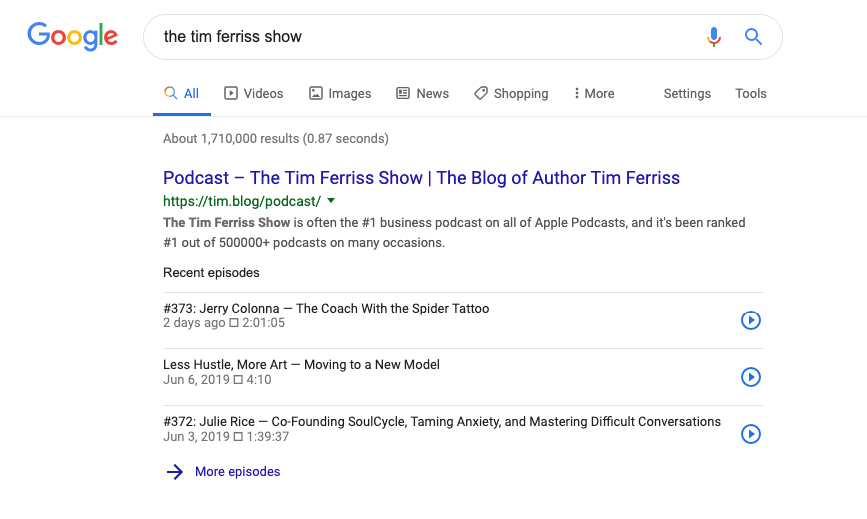Every year, Google hosts their I/O Conference, bringing together developers from around the world to learn from Google experts, and get an early look at the latest developer projects. One of the most interesting takeaways from the 2019 I/O Conference was the revelation that Google will be (and in some cases, already is!) showing podcasts in search results.
This is one of the early results that indicates Google is now indexing podcast content and providing audio clips in search results.
Is Google Able to Transcribe Audio Content?
Yes. Google has offered a speech-to-text service as part of the Google Cloud Platform since 2017, which we’ve already seen get some upgrades. Not long ago, Android Police found changes in source code that suggested Google was transcribing some podcasts on the Google Podcasts platform.
Not only this, but Google sends automatic transcripts of voicemails on Google Pixel phones and to Google Voice numbers.
There’s also evidence of this in the search results, but with video. Google started testing suggested YouTube video clips in search results in April 2017. Starting with video makes sense for Google because of their profits. They own YouTube, which is much larger than Google Podcasts, so it was a smarter financial move to start there. It works by providing search results based on the audio portion of a video, so it stands to reason they can apply the same technology to audio files.
How Will Audio Appear in Search?
We can expect the starting points to be extensions of the Google podcast engine, including both automatic transcription and full-text and full-audio search. Both of these things are already in the works. Once you’re able to search within Google Podcasts, we can expect that to expand to general Google searches as well.
Right now, there is the question as to whether Google will return audio content or transcribed text. In some situations, it may be better to return audio clips for better matching user intent. If you’re searching for something you hear in a podcast, it makes for a much better experience to be able to hear the audio rather than having to sift through plain text to find it. The big advantage however, is to voice devices such as Google Home and Amazon Echo. Being able to return audio results fills the content gap for these smart speakers and voice devices, and bridges into full podcasts along with other non-text content.
Should I Start a Podcast?
Well, that’s entirely up to you since starting a decent podcast requires a bit more time, effort, and planning than simply grabbing a microphone and recording what you have to say. It’s true we are in the middle of a small podcast revival, and it’s reasonable to think that audio search may cause that revival to grow even more.
Before you get too excited, remember Google will always gradually release changes and test them for a few weeks – maybe even a few months. If you’re planning to start a podcast, don’t do it just because Google’s going to start including them in results. Do it to serve your audience first and foremost – because that’s how you earn brownie points with Google anyway.
If you’ve already got a podcast and you want to make it search accessible, it’s important to make sure you’ve added it to Google Podcasts, and are entering the available metadata. If you’re not – go get started on that now – updating all the metadata you can.
All that you’ll really need to get your content transcribed is a clean audio file in a format that Google can easily process. That said, it’s important to consider how the audio content is structured, since completely free-form content may be harder for Google to parse and evaluate. Make sure your podcast theme is evident, along with the theme of each episode. Do you have a structure where a machine could separate questions from answers? Do you have concise takeaways, such as a summary at the end of each episode.
Audio SEO ultimately means we’ll need to be more deliberate and structured with our approach to audio. As Google continues to grow and evolve across devices, we need to be hyper aware of the content that best fits our audience’s needs. Is the searcher looking for video, audio, or text? Each modality is there to fit a different need and a different device or set of devices in the search landscape.
Are you excited about the potential audio SEO brings to the marketing landscape? Share your thoughts in the comments. I’d love to hear from you!


